Fintech
United States – FinTech
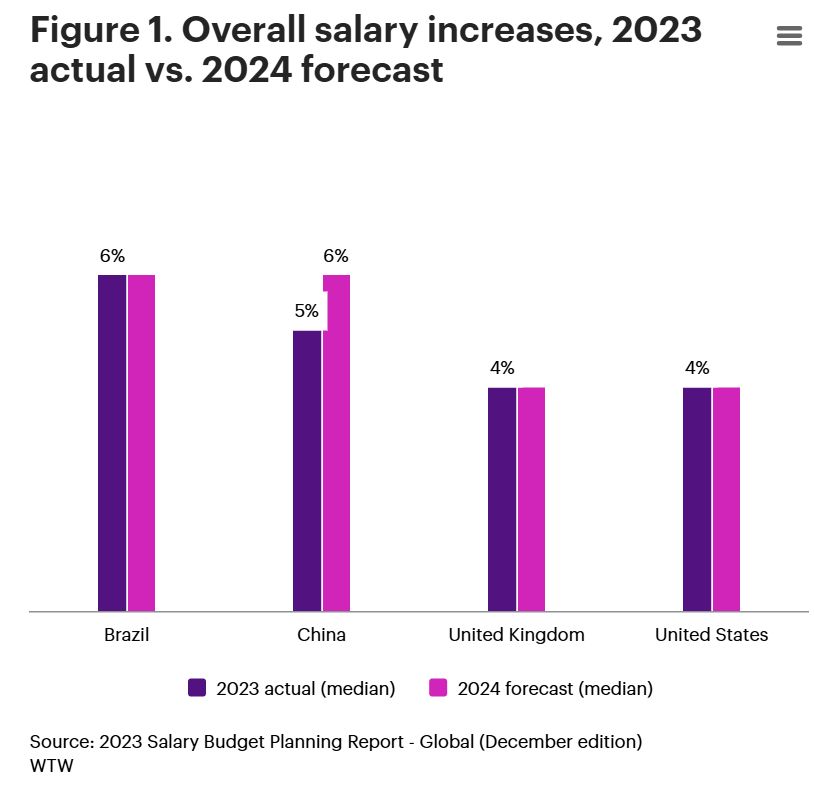
Given the global rush to digital transformation and the desire across every industry to have a strong technology presence, fintech has certainly not been immune to the competition for talent. This makes it important for fintech organizations to review their talent and rewards strategies relative to the broader tech and finance markets.
Fintech Payment Practices
Last year, fintech organizations continued to increase their salary budgets despite ongoing economic volatility and geopolitical uncertainty. This was expected to continue this year, driven by the recognition that salaries are critical to attracting and retaining top talent (Figure 1).
In the United States, fintech jobs that received the highest average base salary last year included:
- Product development
- User Experience Design
- IT Architecture
- Database design and analysis
- Project/Program Management
These high base salaries were seen across both the professional and executive career ladders, according to data from our 2023 WTW Fintech Compensation Survey – USA. This indicates the strong demand for talent in these fields. U.S. fintech executives also received pay raises that outpaced the inflation rate of 3.4% (Figure 2).
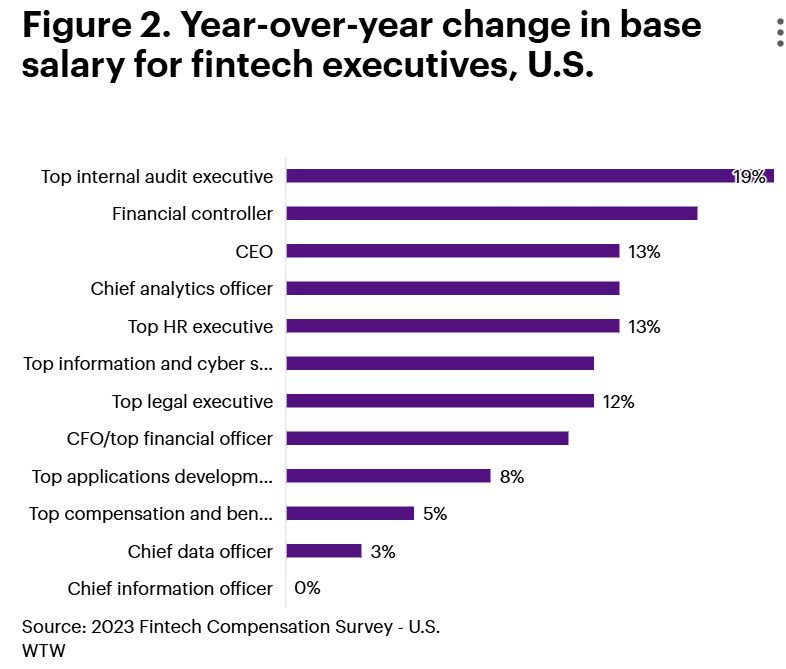
We expect employers to be more cautious in how they allocate payroll budgets this year. This is due to the need to balance compensation expenses with overall financial sustainability.
Examining the competitiveness of financial technology in the United States
To determine the competitiveness of the fintech market, we looked at similar industries, including technology, media and gaming (TMG) and financial services (FS), and compared base salary, total compensation, and bonus opportunities.
The median annual base salary in the US fintech sector for middle managers, senior managers, and executive-level employees tends to be lower than FS. However, fintech beats TMG for annual base salary in middle and senior management roles (Figure 3).
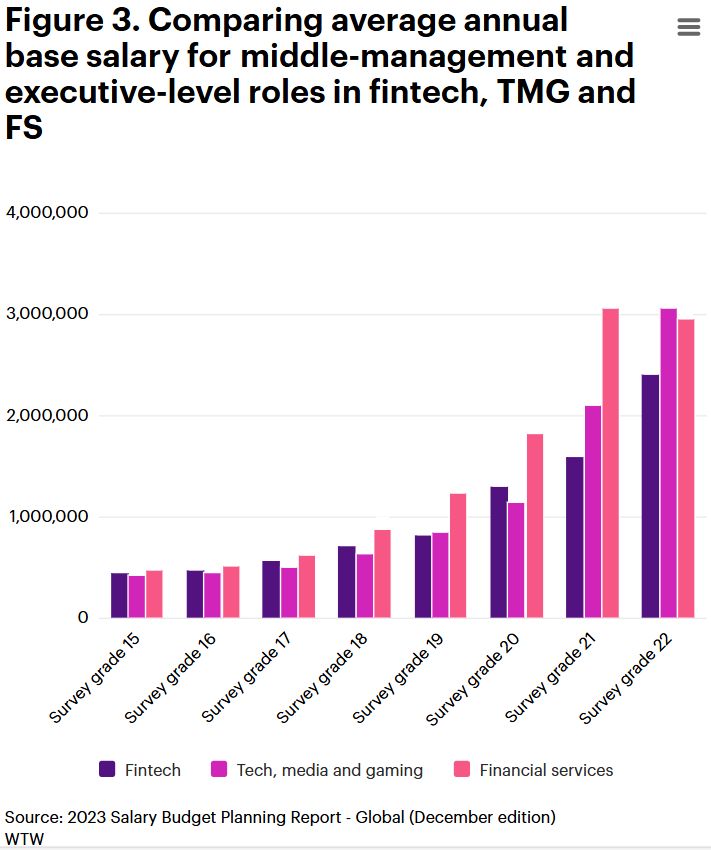
Total direct compensation (TDC) in fintech is also lower than that of financial executives at all levels of the survey and exceeds TMG for middle and senior management groups (Figure 5).
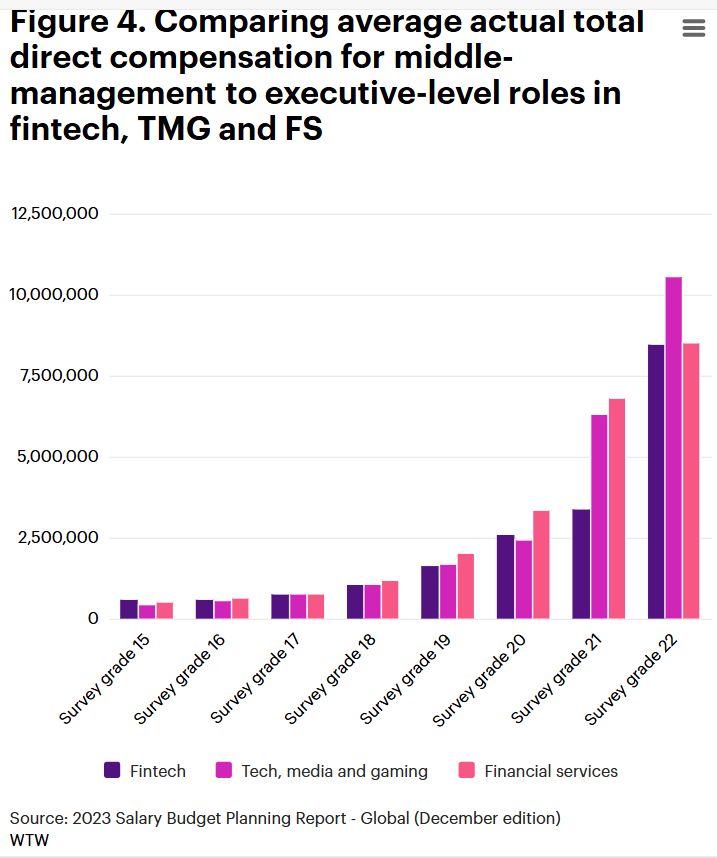
Figures 3 and 4 indicate that the US fintech industry is not as competitive as FS; rather, fintech focuses on competitive compensation for middle and senior management roles. However, it is also important to examine annual bonus practices and long-term incentives (LTI) in the industry to gain a complete picture of fintech’s current total reward strategy.
Average bonuses in the US
Our analysis of bonus payouts in fintech revealed some interesting trends. Executives and managers consistently exceeded their bonus opportunities, with average bonus payouts above target. Payouts (calculated as actual/target bonus) ranged from 1% to 8% above target for middle management and from 6% to 18% above target for executives.
In contrast, individual contributors generally missed their bonus opportunities. Although their payments were substantial, they fell short of target. Their payments ranged from 10% below target (mostly junior roles) to 4% below target (specialist levels). This suggests there may be room for improvement in goal setting and performance management, or in providing additional support to help individual contributors reach their full potential.
Several factors, both internal and external, are influencing these trends. Within organizations, different roles and tiers are measured by different metrics. Externally, market conditions, market competition, and regulatory changes can impact overall company performance and, in turn, bonus payouts.
LTI in the US Fintech Sector
In terms of long-term incentives, fintech firms outperform financial firms in C-suite and management positions, suggesting that fintech firms are strategically using long-term incentives to retain key talent and create a long-term focus on the business.
Fintech also outperforms TMG in offering LTI to middle management. However, for more senior and executive roles, TMG outperforms both Fintech and FS (Figure 5).
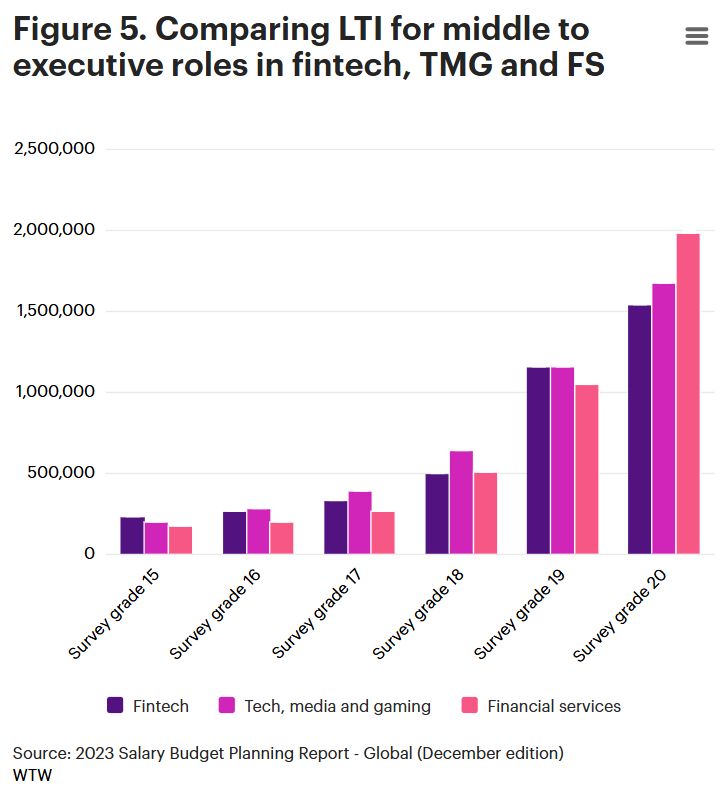
Message to Fintech Organizations: Leverage Your Assets
While fintech organizations may be more cautious about increasing salaries in 2024, there are areas beyond base pay that can be leveraged competitively. By strengthening annual bonus and LTI opportunities, fintech organizations can improve their total rewards strategy to attract and retain talent. Additionally, these measures will help motivate and retain employees long-term.
To maximize these efforts, fintech organizations need market data that reflects their talent gaps and potential career paths. By taking these actions, fintech organizations can create a total rewards strategy that targets the critical skills their business needs and acquires the talent that will help them achieve long-term goals.
The content of this article is intended to provide general guidance on the subject. It is recommended that you seek professional advice regarding your specific circumstances.
Fintech
Lloyds and Nationwide invest in Scottish fintech AI Aveni

Lloyds Banking Group and Nationwide have joined an £11m Series A funding round in Scottish artificial intelligence fintech Aveni.
The investment is led by Puma Private Equity with additional participation from Par Equity.
Aveni creates AI products specifically designed to streamline workflows in the financial services industry by analyzing documents and meetings across a range of operational functions, with a focus on financial advisory services and consumer compliance.
The cash injection will help fund the development of a new product, FinLLM, a large-scale language model created specifically for the financial sector in partnership with Lloyds and Nationwide.
Joseph Twigg, CEO of Aveni, explains: “The financial services industry doesn’t need AI models that can quote Shakespeare, it needs AI models that offer transparency, trust and, most importantly, fairness. The way to achieve this is to develop small, highly tuned language models, trained on financial services data, vetted by financial services experts for specific financial services use cases.
“FinLLM’s goal is to set a new standard for the controlled, responsible and ethical adoption of generative AI, outperforming all other generic models in our selected financial services use cases.”
Robin Scher, head of fintech investment at Lloyds Banking Group, says the development programme offers a “massive opportunity” for the financial services industry by streamlining operations and improving customer experience.
“We look forward to supporting Aveni’s growth as we invest in their vision of developing FinLLM together with partners. Our collaboration aims to establish Aveni as a forerunner in AI adoption in the industry, while maintaining a focus on responsible use and customer centricity,” he said.
Fintech
Fairexpay: Risk consultancy White Matter Advisory acquires 90% stake in fintech Fairexpay

Treasury Risk Consulting Firm White Matter Alert On Monday he announced the acquisition of a 90% stake in the fintech startup Fair payment for an undisclosed amount. The acquisition will help White Matter Advisory expand its portfolio in the area of cross-border remittance and fundraising services, a statement said. White Matter Advisory, which operates under the name SaveDesk (White Matter Advisory India Pvt Ltd), is engaged in the treasury risk advisory business. It oversees funds under management (FUM) totaling $8 billion, offering advisory services to a wide range of clients.
Improve your technology skills with high-value skills courses
| IIT Delhi | Data Science and Machine Learning Certificate Program | Visit |
| Indian School of Economics | ISB Product Management | Visit |
| MIT xPRO | MIT Technology Leadership and Innovation | Visit |
White Matter Advisory, based in Bangalore, helps companies navigate the complexities of treasury and risk management.
Fairexpay, authorised by the Reserve Bank of India (RBI) under Cohort 2 of the Liberalised Remittance Scheme (LRS) Regulatory Sandbox, boasts features such as best-in-class exchange rates, 24-hour processing times and full security compliance.
“With this acquisition, White Matter Advisory will leverage Fairexpay’s advanced technology platform and regulatory approvals to enhance its services to its clients,” the release reads.
The integration of Fairexpay’s capabilities should provide White Matter Advisory with a competitive advantage in the cross-border remittance and fundraising market, he added.
The release also states that by integrating Fairexpay’s advanced technology, White Matter Advisory aims to offer seamless and convenient cross-border payment solutions, providing customers with secure options for international money transfers.
Fintech
Rakuten Delays FinTech Business Reorganization to 2025

Rakuten (Japan:4755) has released an update.
Rakuten Group, Inc. and Rakuten Bank, Ltd. announced a delay in the reorganization of Rakuten’s FinTech Business, moving the target date from October 2024 to January 2025. The delay is to allow for a more comprehensive review, taking into account regulatory, shareholder interests and the group’s optimal structure for growth. There are no anticipated changes to Rakuten Bank’s reorganization objectives, structure or listing status outside of the revised timeline.
For more insights on JP:4755 stock, check out TipRanks Stock Analysis Page.
Fintech
White Matter Advisory Acquires 90% Stake in Fintech Startup Fairexpay

You are reading Entrepreneur India, an international franchise of Entrepreneur Media.
White Matter Advisory, which operates under the name SaveDesk in India, has announced that it is acquiring a 90% stake in fintech startup Fairexpay for an undisclosed amount.
This strategic move aims to strengthen White Matter Advisory’s portfolio in cross-border remittance and fundraising services.
By integrating Fairexpay’s advanced technology, White Matter Advisory aims to offer seamless and convenient cross-border payment solutions, providing customers with secure options for international money transfers.
White Matter Advisory, known for its treasury risk advisory services, manages funds under management (FUM) totaling USD 8 billion.
Founded by Bhaskar Saravana, Saurabh Jain, Kranthi Reddy and Piuesh Daga, White Matter Advisory helps companies effectively manage the complexities of treasury and risk management.
The SaveDesk platform offering includes a SaaS-based FX market data platform with real-time feeds for over 100 currencies, bank cost optimization services, customized treasury risk management solutions, and compliance guidance for the Foreign Exchange Management Act (FEMA) and other trade regulations.
Fairexpay is a global aggregation platform offering competitive currency exchange rates from numerous exchange partners worldwide. Catering to both private and corporate customers, Fairexpay provides seamless money transfer solutions for education, travel and immigration, as well as simplifying cross-border payments via API and white-label solutions for businesses. Key features include competitive currency exchange rates, 24-hour processing times, extensive currency coverage of over 30 currencies in more than 200 countries, and secure, RBI-compliant transactions.
-

 DeFi1 year ago
DeFi1 year agoSwitchboard Revolutionizes DeFi with New Oracle Aggregator
-

 News1 year ago
News1 year agoLatest Business News Live Updates Today, July 11, 2024
-

 DeFi1 year ago
DeFi1 year agoIs Zypto Wallet a Reliable Choice for DeFi Users?
-

 DeFi1 year ago
DeFi1 year ago👀 Lido prepares its response to the recovery boom
-

 Fintech1 year ago
Fintech1 year agoFinTech LIVE New York: Mastercard and the Power of Partnership
-

 DeFi1 year ago
DeFi1 year agoEthena downplays danger of letting traders use USDe to back risky bets – DL News
-

 Fintech1 year ago
Fintech1 year ago121 Top Fintech Companies & Startups To Know In 2024
-

 ETFs1 year ago
ETFs1 year agoGold ETFs see first outing after March 2023 at ₹396 cr on profit booking
-

 DeFi1 year ago
DeFi1 year agoTON Network Surpasses $200M TVL, Boosted by Open League and DeFi Growth ⋆ ZyCrypto
-

 Fintech1 year ago
Fintech1 year agoFintech unicorn Zeta launches credit as a UPI-linked service for banks
-

 ETFs1 year ago
ETFs1 year agoLargest US Bank Invests in Spot BTC ETFs While Dimon Remains a Bitcoin Hater ⋆ ZyCrypto
-

 News1 year ago
News1 year agoSalesforce Q1 2025 Earnings Report (CRM)





